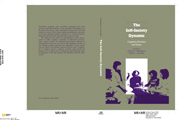Book contents
- Frontmatter
- Contents
- Contributors
- Preface and acknowledgments
- Introduction: The self–society dynamic
- 1 Exploring the relevance of social cognition for the relationship of self and society: Linking the cognitive perspective and identity theory
- 2 Toward a sociology of cognition
- 3 The cerebral self: Thinking and planning about identity-relevant activity
- 4 Growing up: The development and acquisition of social knowledge
- 5 The social contexts of self-feeling
- 6 Self-processes and emotional experiences
- 7 An affect control view of cognition and emotion
- 8 The self-concept as a basis for a theory of motivation
- 9 Attitudes, behavior, and the self
- 10 From changing selves toward changing society
- 11 Possible selves and social support: Social cognitive resources for coping and striving
- 12 Is the road to helping paved with good intentions? Or inertia?
- 13 Social structure and the moral self
- 14 The production of selves in personal relationships
- 15 Conclusion
- Indexes
4 - Growing up: The development and acquisition of social knowledge
Published online by Cambridge University Press: 23 September 2009
- Frontmatter
- Contents
- Contributors
- Preface and acknowledgments
- Introduction: The self–society dynamic
- 1 Exploring the relevance of social cognition for the relationship of self and society: Linking the cognitive perspective and identity theory
- 2 Toward a sociology of cognition
- 3 The cerebral self: Thinking and planning about identity-relevant activity
- 4 Growing up: The development and acquisition of social knowledge
- 5 The social contexts of self-feeling
- 6 Self-processes and emotional experiences
- 7 An affect control view of cognition and emotion
- 8 The self-concept as a basis for a theory of motivation
- 9 Attitudes, behavior, and the self
- 10 From changing selves toward changing society
- 11 Possible selves and social support: Social cognitive resources for coping and striving
- 12 Is the road to helping paved with good intentions? Or inertia?
- 13 Social structure and the moral self
- 14 The production of selves in personal relationships
- 15 Conclusion
- Indexes
Summary
Sociologists are generally concerned with understanding the interface between self and society. A variety of interface mechanisms have been suggested including, but not limited to, “role taking” and “role making” (Cicourel, 1974; Stryker, 1980; Smith-Lovin, this volume; Heise, 1987), development of shared meanings (Stryker, 1980; Burke, this volume; Smith-Lovin, this volume), development of common language (Cicourel, 1974; Shibutani, 1961; Luria, 1981; Callero, this volume), development of common response (Goffman, 1963; Heise, 1987; Smith-Lovin, this volume), and identity formulation (Stryker & Serpe, 1982; Serpe, 1987, this volume; Howard, this volume; Smith-Lovin, this volume; Blumstein, this volume; Burke, this volume; Stryker, this volume). Underlying all of these conceptions is the notion that what information individuals have, and what information they share with others, is somehow key to the self–society interface. It is generally acknowledged that individuals do not acquire this information in a vacuum, but that the social context affects what information they acquire and what information they consider salient. For example, the extant social context impacts the individual's notion of self (Turner & Billings, this volume; Smith-Lovin, this volume; Stryker, this volume) and the individual's conception of others (Heise, 1987; Smith-Lovin, this volume). Two of the aspects of social context that have been explored include social structure and social knowledge.
- Type
- Chapter
- Information
- The Self-Society DynamicCognition, Emotion and Action, pp. 75 - 102Publisher: Cambridge University PressPrint publication year: 1991
- 3
- Cited by

